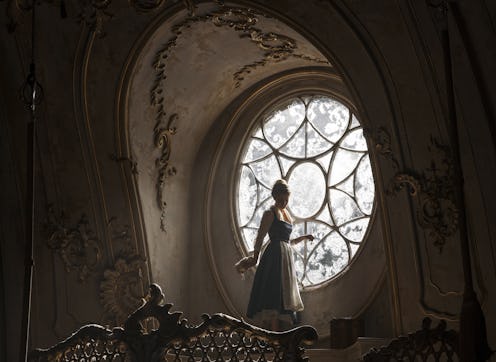
In Disney's live-action Beauty & The Beast, Emma Watson's version of the town inventor's daughter is introduced the same way that she is in the original animated version. Belle strolls through her little French village, mostly running errands, but also pausing to read and dream. Though she exchanges "bonjours" with everyone she meets, the interactions — except her conversation with the gentleman who lends her books and a reading lesson with a child — are all polite and perfunctory. This is the kind of town where no one is a stranger, but for Belle, those streets may as well have been empty. More than any other Disney princess movie, Beauty & The Beast investigates loneliness — the kind that seeps through even when you're surrounded by people.
Most Disney princesses are "othered" early in their movies for one reason or another. She's too beautiful; she's too strong-willed; she's too much of a dreamer. Usually, it's all of the above. But Belle stands out, beginning with her eponymous introductory song. She sings about how this village can't meet her needs, all while her neighbors sing about how they're confused and annoyed by her. Belle is stuck in a pattern where she doesn't expect to ever develop a meaningful friendship unless she leaves, so her books are much more satisfying companions than the other villagers.
I've considered Belle to be an introvert ever since I learned what that word means. (According to Myers & Briggs, it's someone who draws energy mostly from their "inner world.") And being an introvert may account for some of her loneliness. In an article for Psychology Today, author Sophia Dembling writes about "the loneliness loop." If social interactions are stressful or simply not rewarding, that can prompt a person to "retreat" further and avoid future attempts.
That's not to say that Belle's village is some progressive pool of suitable confidantes and she's just ignoring all of them. She's relentlessly pursued by a brute who won't take "no" for an answer and her attempts at streamlining the "woman's work" she needs to do so she can learn more are met with sexist vitriol and ridicule. But presumably, not everyone in town is a woman-hating, knowledge-hoarding schoolmaster or an 1800s Axe Body Spray ad with an antler fetish. In describing how introverts experience loneliness in the same Psychology Today article, Dembling explained why a person like Belle might not seek out even casual friendships. She said:
"Introverts can be perfectly happy alone, or terribly lonely in a crowd. But if introverts are at any particular risk for loneliness, it could be because we set a high bar for friendship. We desire and require deep connections and would rather be lonely alone than in a crowd. But realistically, those deep connections are not easy to find, and if we get caught short and our only choice is superficial socializing or nothing, we can get lonely."
Basically, Belle is the kind of person who'd rather have one best friend than 15 lower-tier friends. And when I think about this passage in relation to her eventual imprisonment at the Beast's castle, the troubling politics of her love affair with the cursed prince get an interesting layer. The romance has been unfavorably compared to the phenomenon of Stockholm Syndrome, wherein a captive begins to mentally align with their captor for the sake of survival. But the 2017 movie adds some material that underlines Belle's continued defiance towards the Beast. And perhaps an intimate situation like this — though un-forced intimacy would have been preferable — is the only way for this introverted heroine to really connect with someone on a very deep level.
As their friendship develops, Belle and the Beast have a conversation on the castle grounds about feeling lonely even when they're not alone. It's a condition they share. For the Beast, it's different. His loneliness is of his own making. Though his servants are still with him and dedicated to his comfort, he isolates himself from them emotionally because of the guilt he feels for dooming them to their current form. In this new movie, Belle is made aware of the curse and the Beast is finally about to do some unloading of that guilt. That's when the walls begin to come down. And as the movie continues, the Beast begins to look happier and healthier as he reaps the psychological benefits of significant social interaction.
Professor John T. Cacioppo of the University Of Chicago's psychology department told The New Times last year that people who are lonely may be afraid to seek out help for fear that they'll be seen as unwanted and undesirable. "Denying you feel lonely makes no more sense than denying you feel hunger," Cacioppo said. Yet it can remain an unspoken need. So though the most accessible moral of Beauty & The Beast is one about first impressions and kindness, it's quietly powerful that the movie addresses the stigma of loneliness too.